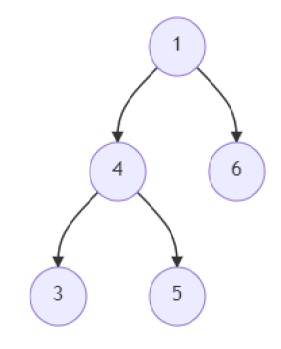
 Data Structure
Data Structure Networking
Networking RDBMS
RDBMS Operating System
Operating System Java
Java MS Excel
MS Excel iOS
iOS HTML
HTML CSS
CSS Android
Android Python
Python C Programming
C Programming C++
C++ C#
C# MongoDB
MongoDB MySQL
MySQL Javascript
Javascript PHP
PHP
- Selected Reading
- UPSC IAS Exams Notes
- Developer's Best Practices
- Questions and Answers
- Effective Resume Writing
- HR Interview Questions
- Computer Glossary
- Who is Who
Program to find out the largest sum value of a BST in a given binary tree in Python
Suppose we are provided a binary tree. We have to find out if there exist binary search trees (BST) in the subtrees of it and find out the sum of the largest BST. To find out the sum, we add the values of each node in that BST. We return the sum value as output.
So, if the input is like

then the output will be 12.
The BST in the given binary tree is −

sum of the nodes = 12.
To solve this, we will follow these steps −
- c := 0
- m := null
- value := 0
- Define a function recurse() . This will take node
- if node is not null, then
- left_val := recurse(left of node)
- right_val := recurse(right of node)
- count := negative infinity
- if (node.left is same as null or node.left.val <= node.val) and( (right of node is same as null or node.val <= node.right.val), then
- count := left_val + right_val + 1
- if count > c, then
- c := count
- m := node
- return count
- return 0
- if node is not null, then
- Define a function calculate_sum() . This will take root
- if root is not same as null, then
- calculate_sum(left of root)
- value := value + value of root
- calculate_sum(right of root)
- if root is not same as null, then
- recurse(root)
- calculate_sum(m)
- return value
Example
Let us see the following implementation to get better understanding −
class TreeNode: def __init__(self, val, left = None, right = None): self.val = val self.left = left self.right = right def insert(temp,data): que = [] que.append(temp) while (len(que)): temp = que[0] que.pop(0) if (not temp.left): if data is not None: temp.left = TreeNode(data) else: temp.left = TreeNode(0) break else: que.append(temp.left) if (not temp.right): if data is not None: temp.right = TreeNode(data) else: temp.right = TreeNode(0) break else: que.append(temp.right) def make_tree(elements): Tree= TreeNode(elements[0]) for element in elements[1:]: insert(Tree, element) return Tree def solve(root): c, m, value = 0, None, 0 def recurse(node): if node: nonlocal c, m left_val = recurse(node.left) right_val = recurse(node.right) count = -float("inf") if (node.left == None or node.left.val <= node.val) and (node.right == None or node.val <= node.right.val): count = left_val + right_val + 1 if count > c: c = count m = node return count return 0 def calculate_sum(root): nonlocal value if root is not None: calculate_sum(root.left) value += root.val calculate_sum(root.right) recurse(root) calculate_sum(m) return value tree = make_tree([1, 4, 6, 3, 5]) print(solve(tree)) Input
tree = make_tree([1, 4, 6, 3, 5]) print(solve(tree))
Output
12

Advertisements
